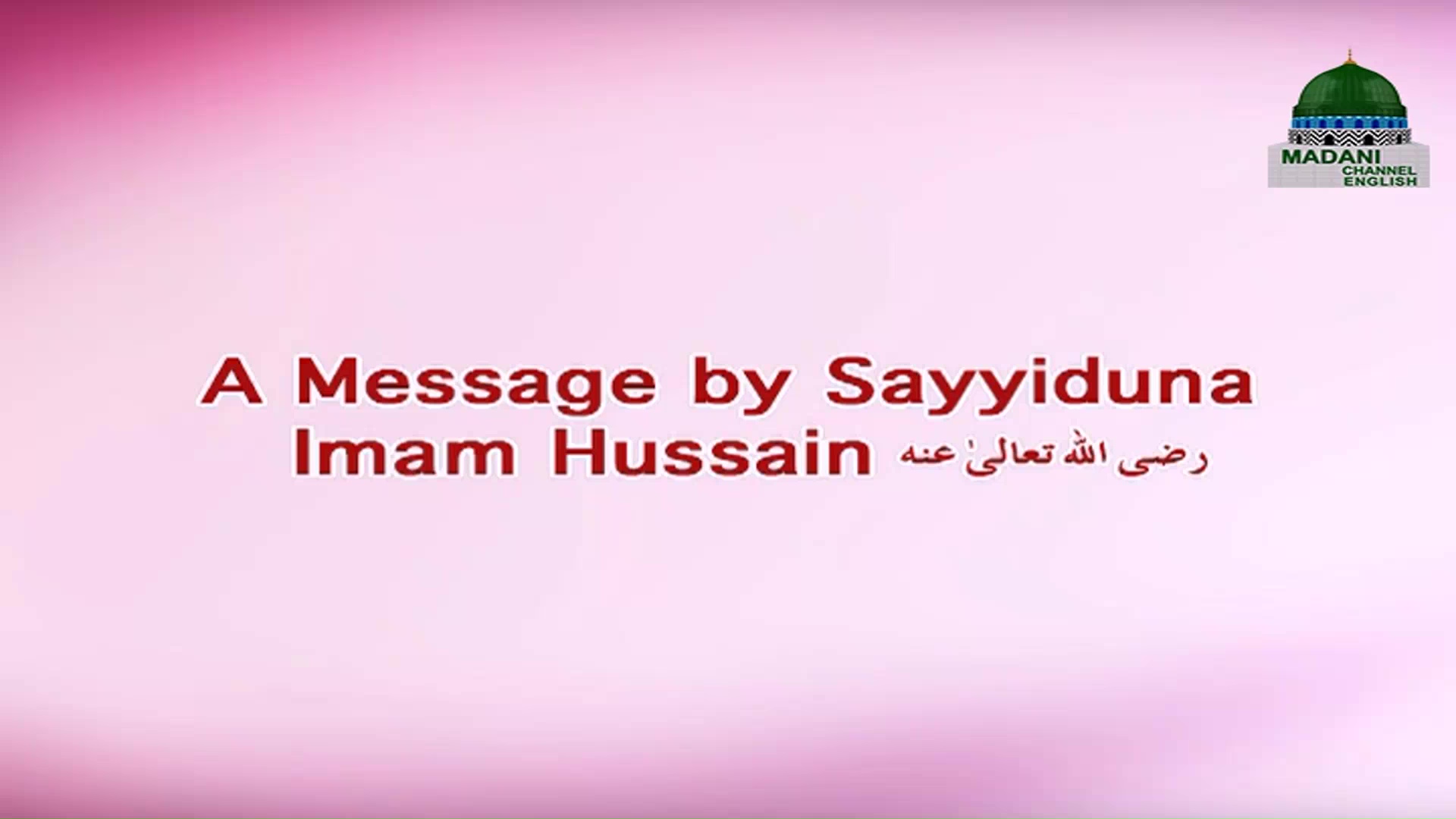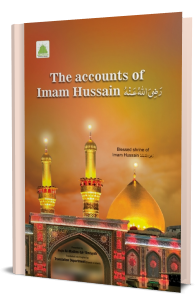
Shining Stars
6 Great Qualities of Sayyiduna Imam Ḥusayn رَضِىَ اللّٰهُ عَـنْهُ
Mawlana Abu al-Nur Rashid Ali Attari Madani
Imam Ḥusayn رَضِىَ اللّٰهُ عَـنْهُ was a man of noble character and habits because he was raised under the care of the one about whom Allah Almighty said:
وَ اِنَّکَ لَعَلٰی خُلُقٍ عَظِیْمٍ (۴)
and you possess an impeccable character.[1]
Like his grandfather, Imam Ḥusayn رَضِىَ اللّٰهُ عَـنْهُ was affectionate and loving towards the poor and needy. He would comfort them and never displayed pride or arrogance. Performing worship, observing the rights of Allah Almighty and creation, and other great qualities were prominent aspects of his personality. Here are details about six of his great qualities.
1. Worship and spiritual discipline
Imam Ḥusayn رَضِىَ اللّٰهُ عَـنْهُ regularly performed an abundance of voluntary prayers, observed fasts, gave charity in the way of Allah Almighty, performed Hajj, and participated in other acts of goodness, all of which were distinguishing features of his noble character. It is written in Usd Al-Ghābah: “Imam Ḥusayn رَضِىَ اللّٰهُ عَـنْهُ was a man of excellence and perfection. He frequently observed fasts, engaged in worship and spiritual discipline extensively, gave to charity generously, and carried out all kinds of virtuous deeds.”[2]
1,000 units of voluntary prayer
Imam Zain al-ꜤĀbidīn رَضِىَ اللّٰهُ عَـنْهُ reports that Imam Ḥusayn رَضِىَ اللّٰهُ عَـنْهُ used to offer 1,000 units of voluntary prayer during the day and night.[3]
Travelling on foot to perform Hajj
Sayyidunā MuṣꜤab al-Zubayrī رَضِىَ اللّٰهُ عَـنْهُ said, “Imam Ḥusayn رَضِىَ اللّٰهُ عَـنْهُ performed Hajj on foot 25 times.”[4]
Fasting on the Day of ꜤArafah
A man from Egypt went to Imam Ḥasan and Imam Ḥusayn رَضِیَ اللّٰهُ عَنْهُمَا on the Day of ꜤArafah and asked them about fasting on that day. He found that Imam Ḥusayn رَضِىَ اللّٰهُ عَـنْهُ was fasting, while Imam Ḥasan رَضِىَ اللهُ عَـنْهُ was not. The two Imams said, “Both options are correct (i.e., this is an optional fast. Observing it is permissible, and the one who does not is not sinful).”[5]
2. Humility and modesty
One of the noble qualities of Imam Ḥusayn رَضِىَ اللّٰهُ عَـنْهُ was that despite his exalted lineage, he was the embodiment of humility and modesty. He was so fond of humility that he never felt any hesitation in sharing a meal with the poor and needy. Sayyidunā ꜤAmr رَضِىَ اللّٰهُ عَـنْهُ reports:
The wife of Imam Ḥusayn رَضِىَ اللّٰهُ عَـنْهُ sent him a message saying, “We have prepared delicious food and perfume for you. Please come to us with people of your status.” Imam Ḥusayn رَضِىَ اللّٰهُ عَـنْهُ went to the masjid and took the poor and needy with him to his home. The neighbouring women went to his wife and said, “By Allah, the poor have gathered at your house.” Imam Ḥusayn رَضِىَ اللّٰهُ عَـنْهُ said to his wife, “I swear by the right I have over you that you shall not save any food or perfume for later.” Then she acted accordingly. Imam Ḥusayn رَضِىَ اللّٰهُ عَـنْهُ fed the poor, and gave them clothes and fragrance.[6]
3. Respect for the elder brother
In terms of Islamic morals and etiquette, respecting and honouring the elder brother is just as essential upon younger brothers as respecting and honouring the father is. Imam Ḥusayn رَضِىَ اللّٰهُ عَـنْهُ had great respect for his elder brother, Imam Ḥasan رَضِىَ اللّٰهُ عَـنْهُ. Once, a man asked Imam Ḥasan رَضِىَ اللّٰهُ عَـنْهُ for something, to which he replied, “It is not permissible to ask from anyone except in three cases: heavy debt, poverty that causes neediness, and overwhelming financial liability.” The man replied, “I have come for one of these reasons.” Imam Ḥasan رَضِىَ اللّٰهُ عَـنْهُ ordered for 100 dīnārs to be given to him.
Then he asked Imam Ḥusayn رَضِىَ اللّٰهُ عَـنْهُ for help, and the Imam said exactly what his elder brother said. The man gave the same response he gave to Imam Ḥasan رَضِىَ اللّٰهُ عَـنْهُ. Imam Ḥusayn asked, “What did my brother give you?” He replied, “100 dīnārs.” Disliking equivalence with his brother, Imam Ḥusayn رَضِىَ اللّٰهُ عَـنْهُ gave him 99 dīnārs.[7]
The desire not to enter Paradise before his brother
Sayyidunā Abū Hurairah رَضِىَ اللّٰهُ عَـنْهُ reports that the beloved Prophet صَلَّى الـلّٰـهُ عَلَيْهِ وَاٰلِهٖ وَسَلَّم said, “It is not permissible for a Muslim to cut ties with his brother for more than three nights, and the one who initiates reconciliation will enter Paradise first.”
Sayyidunā Abū Hurairah رَضِىَ اللّٰهُ عَـنْهُ said:
I came to know that due to some matter, Imam Ḥasan and Imam Ḥusayn رَضِیَ اللّٰهُ عَنْهُمَا were not talking to each other. So, I said to Imam Ḥusayn رَضِىَ اللّٰهُ عَـنْهُ, “People consider both of you as their leaders, so do not remain aloof from each other. Go to your brother and reconcile because you are younger.” Imam Ḥusayn رَضِىَ اللّٰهُ عَـنْهُ responded, “If I had not heard the saying of the Merciful Prophet صَلَّى الـلّٰـهُ عَلَيْهِ وَاٰلِهٖ وَسَلَّم, ‘The one who initiates reconciliation will enter Paradise first,’ I would surely have gone to him. I do not wish to enter Paradise before him.”
Sayyidunā Abū Hurairah رَضِىَ اللّٰهُ عَـنْهُ said:
After hearing Imam Ḥusayn’s sincere feelings, I went to Imam Ḥasan رَضِىَ اللّٰهُ عَـنْهُ and told him about the entire incident. Imam Ḥasan رَضِىَ اللّٰهُ عَـنْهُ said, “My brother has spoken the truth.” Then he stood up, went to his brother, and spoke with him. Thus, reconciliation took place between the two brothers.[8]
4. Generosity
Dear Islamic brothers! Imam Ḥusayn رَضِىَ اللّٰهُ عَـنْهُ was the shining light of the generous household of Ahl al-Bayt, and therefore generosity, and helping the poor and needy, were a family inheritance for him. This is the reason he was at the forefront of spending in the way of Allah Almighty. Sayyidunā ꜤAbdullāh b. Shaddād رَضِىَ اللّٰهُ عَـنْهُ reports:
Imam Ḥusayn رَضِىَ اللّٰهُ عَـنْهُ passed by a shepherd who was grazing goats. The shepherd presented one goat to him as a gift, and the Imam رَضِىَ اللّٰهُ عَـنْهُ asked, “Are you free or a slave?”
The man answered, “I am a slave.”
Imam Ḥusayn رَضِىَ اللّٰهُ عَـنْهُ returned the goat, and the man said, “This goat belongs to me.”
So, the Imam accepted the goat as a gift. Then the Imam bought the slave along with the sheep and goats, freed him, and gifted the animals to him.[9]
5. Concern for the rights of people
Imam Shams al-Dīn Muḥammad al-Dhahabī رَحْمَةُ الـلّٰـهِ عَـلَيْه reports, “An Anṣārī man was with Imam Ḥusayn رَضِىَ اللّٰهُ عَـنْهُ and said, ‘I am in debt.’ The Imam replied, ‘No person who is in debt should participate in battle alongside me.’”[10]
6. Love for knowledge
Dear Islamic brothers! Imam Ḥusayn رَضِىَ اللّٰهُ عَـنْهُ is unparalleled in the field of knowledge. He received a treasure of knowledge from the city of knowledge, the Beloved Prophet صَلَّى الـلّٰـهُ عَلَيْهِ وَاٰلِهٖ وَسَلَّم, and from the gatekeeper of the city of knowledge, Sayyidunā ꜤAlī رَضِىَ اللّٰهُ عَـنْهُ. He would regularly hold study circles in al-Masjid al-Nabawī.
Sayyidunā MuꜤāwiyah رَضِىَ اللّٰهُ عَـنْهُ, praising Imam Ḥusayn رَضِىَ اللّٰهُ عَـنْهُ, once said to a Qurayshī, “Go to al-Masjid al-Nabawī, there you will find people sitting in a circle with utmost attentiveness and respect, as if birds are perched on their heads. Know that this is the gathering of Imam Ḥusayn رَضِىَ اللّٰهُ عَـنْهُ. Also, his lower garment will be up to mid-calf, and there will be no joking or frivolity in that gathering.”[11]
May Allah Almighty grant us a generous share from the character of Imam Ḥusayn رَضِىَ اللّٰهُ عَـنْهُ, and bless us with devotion to him in this world and the Hereafter.
اٰمِیْنْ بِجَاہِ خاتَمِ النَّبِیّٖن صلَّی اللہُ عَلَیْہ ِوَاٰلِہٖ وَسَلَّمَ
[1] Al-Quran, part 29, Al-Qalam, verse 4
[2] Usd al-Ghābah, vol. 2, p. 28
[3] Al-ꜤIqd al-Farīd, vol. 3, p. 114
[4] Siyar AꜤIām al-Nubalāˈ, vol. 4, p. 407
[5] Al-Ṭabaqāt al-Kabīr li Ibn SaꜤd, vol. 6, p. 413
[6] Makārim al-Akhlāq, p. 375
[7] ꜤUyūn al-Akhbār, vol. 2, p. 158
[8] Dhakhāˈir al-ꜤUqba, p. 238
[9] Muṣannaf Ibn Abī Shaybah, vol. 11, p. 665: Hadith 23645
[10] Siyar ĀꜤlām al-Nubalāˈ, vol. 4, p. 417; al-Ṭabaqāt al-Kabīr li Ibn SaꜤd, vol. 6, p. 437
[11] Tārīkh Ibn ꜤAsākir, vol. 14, p. 179

















Comments